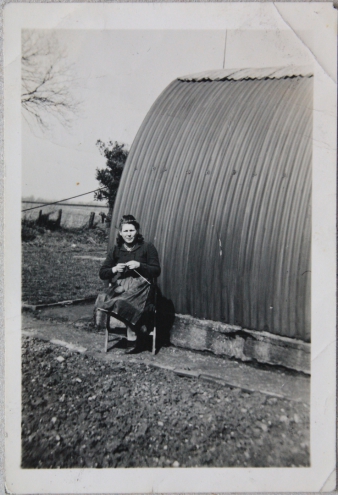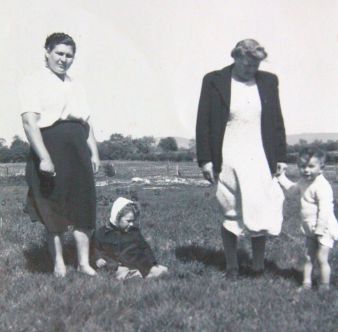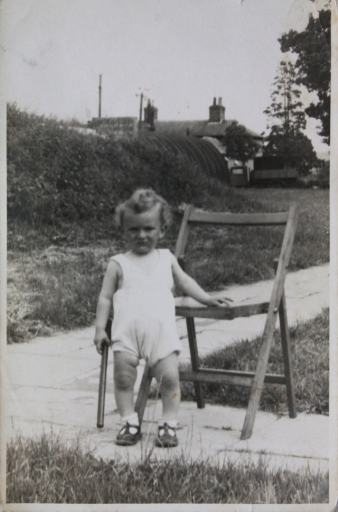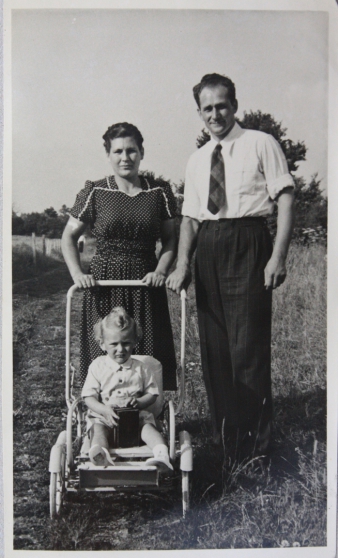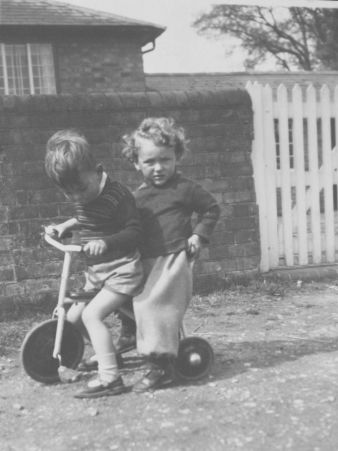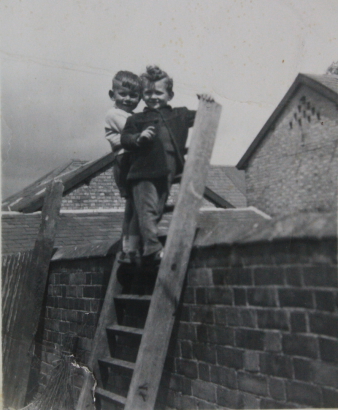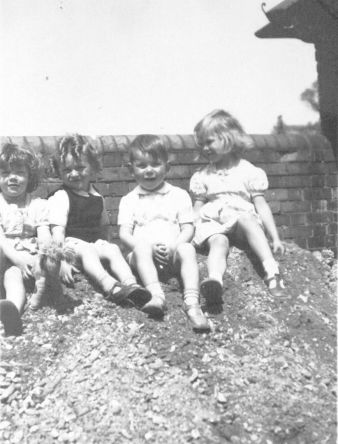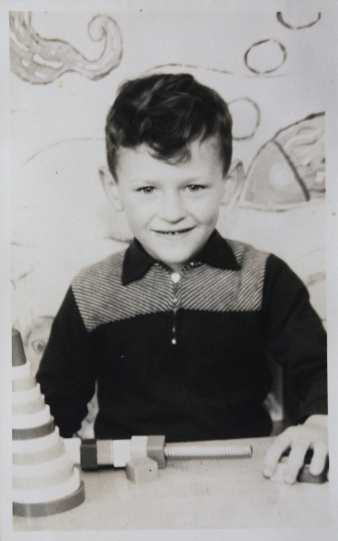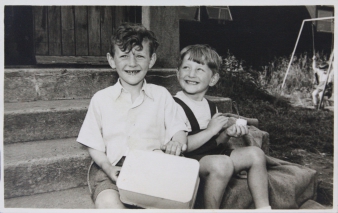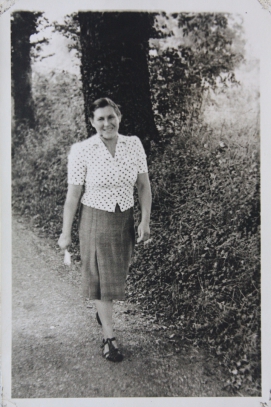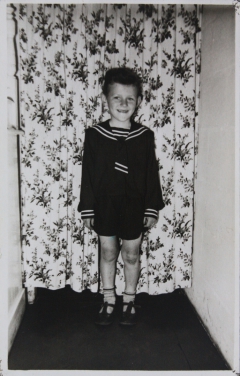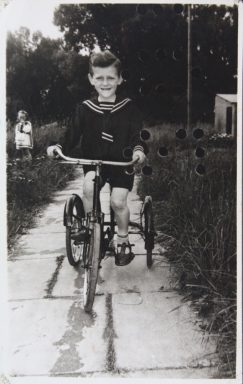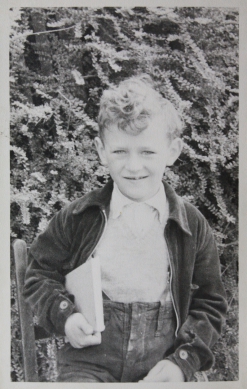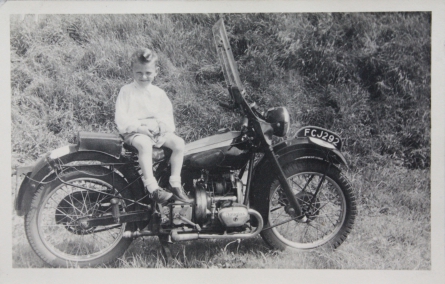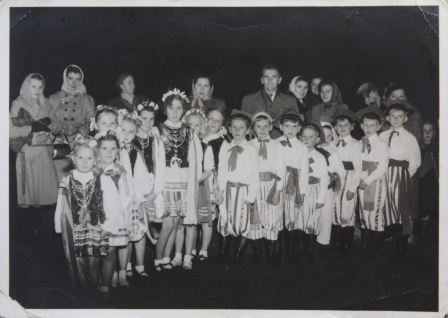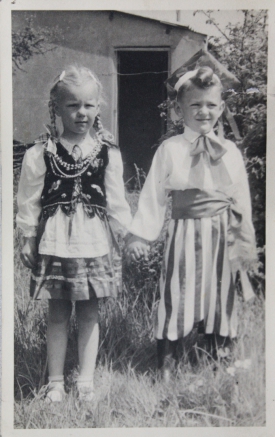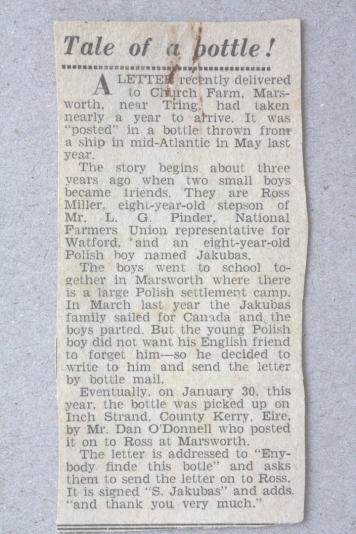Stanislaw Jakubas and Family
My childhood in Marsworth
My father Stanisław Jakubas came from a small village in the Krakow area in the south of Poland. When the war broke out in 1939, he served in the army in Krakow. His light tank unit fought the Germans, retreating to the Hungarian border. After capitulation, he was interned with other soldiers in a camp in Hungary. After a brief stay in the camp, he and a group of Polish soldiers made it to France and then to Homs in Syria where the Polish Carpathian Rifle Brigade was set up.
After the fall of France, the brigade came under the command of the British. He fought in the defence of Tobruk, where he distinguished himself with Lieutenant
Bocheński blowing up an enemy watchtower that was causing problems for the defenders. For this he received the Cross
of Valour and was promoted to the rank of corporal. At this time he served in the 2nd battalion
of the SBSK (Carpathian Rifle Brigade). Later, he was wounded in the leg and head at the
Battle of Tobruk.
In the Italy campaign, he took part in the Battle of Monte Cassino and the rest of the fighting all the way to Ancona. He served as a corporal in the 23rd Transport Company.
It was now 1945 and the war was over. In Italy, he met my mother, who the Germans had deported with her brother for forced labour. They got married in Italy and arrived in the UK probably in the autumn of 1946. I do not know the name of the ship they arrived on, nor do I know if they had a choice about where to live, but it was probably decided by an official – my father was still a soldier. Soldiers in the army studied in a normal school. When possible they completed their education not only in vocational but also general education. They also learned languages. In the army, my father passed the so-called ‘junior high school diploma’ (Polish: mała matura).
Anna by hut
Anna and Stanislaw Jakubas with Mrs Pinder and Ross Miller
at Church Farm
My first memory is of a rough, green military blanket, a bright window and a picture on the wall. Mum fed me in the kitchen by the window through which you could see the white gate of Church Farm.
In front of the barrack and at the side by the entrance was a garden with flowers. Several concrete steps led to up the barrack. I remember the feel of the outer wall which was covered with very rough roofing felt.
Arrival in Marsworth
All my parents dreamed of was a roof over their heads, some work and a quiet life. They were tired of all the wandering caused by the war.
At Marsworth, they lived for some time in a Nissen hut or ‘barrel’ as we Poles called them. My mother said that it was very hot in the summer and very cold in the winter.
Stanislaw at Site 12 with air raid shelter and Church Farm behind
Then they got a small room with a kitchen in a wooden ‘barrack’ (a rectangular shaped building) as we called them. The barrack stood directly opposite the Church Farm gate, at Site 12. This was where I, Stanisław junior, made my appearance.
Parents with pushchair
Another time, we went into Mrs Pinder’s bedroom and there I found a red lipstick on the dresser. I really liked that. I painted my face and the walls of the bedroom. It was my first artistic work.
Many years later I became a graphic artist and painter. Father, on the other hand, had to paint Mrs Pinder's room.
Childhood pranks
There were several other barracks behind our own one in which children of a similar age lived.
I remember very well Ross Miller from Church Farm, who was the nephew of Mrs Pinder, the owner of the farm. He was exactly my age. We had fun together and we played various pranks together.
I remember how we got hold of a crate of beer that the drayman left in the yard by the door. The backyard was paved with stones and we started to roll bottles on these stones. The bottles smashed with a loud ‘boom’ against the wall enclosing the yard. We broke all the bottles in the crate like that.
A great experience was to sneak into the garage where the farmer’s car was. I got into the car and just sat there admiring the various handles, buttons and clocks.
My father's tools were my favourite toys, especially the bicycle pump.
Nursery school
I went to the nursery school, which was next to Church Farm. My mother walked me there.
It was located in a large hut with a semi-circular roof and large windows, with two swings in front of the building, one large and one small and some kind of sandpit. Our mothers made our elevenses, which we carried in special tin containers with a handle. Lunches were cooked by the cook in the nursery.
In the nursery, in addition to games, we learned to dance the Krakowiak. This national dance was later performed during various celebrations.
Life at the hostel
When I started going to nursery school, we moved to site 8, where larger accommodation had become vacant. We had two rooms and a kitchen. Mum cooked meals on a primus stove, which ran on meths and paraffin.
There was no running water in the barrack; it had to be carried in a bucket. The toilets were outside by the side of the barrack. We had a vegetable garden in which my mother planted lettuce, onions, carrots and other vegetables needed in the kitchen.
Father, on the other hand, found a use for the redundant and unused air-raid shelters. In two of the shelters: the one that stood in front of our barrack and the other near the football pitch, he established a mushroom farm.
He bought straw and horse manure from nearby farms, and used them to make heaps of a special mixture on which to grow white mushrooms. He used a large thermometer to
monitor the temperature of the compost. There were enough mushrooms for us and our neighbours and still more for father to sell to a shopkeeper in Tring, delivering them in boxes on his
motorbike.
Next to the entrance stood a large wooden coal box covered with piece of old sheet metal. There was only an entrance door, because there were no doors inside the barrack. The kitchen was separated from the bedroom by a cloth curtain.
There was also no ceiling, only the structure supporting the roof made of planks and painted with white lime. There was an electric light. The light switch hung over my parents’ bed. It was a bit chipped and I pressed my finger in the crack - the current tickled me, and I treated it as fun.
My favourite toys were still my father's tools and everything I found at home. Amongst other things, I played with my father's military decorations. As a result, I lost them somewhere in the grass - I got a good hiding for that.
From site 8, I remember Staszek Antoniak, who was a little older lived in the last barrack near the football pitch.
Jurek Ruszel also lived on Site 8 in the barrack near the bathhouse.
We also played with friends from Site 12. I went there with Jurek and ran around the air-raid shelters treating them like hills. There were not many toys, so every item found, or part of it, was a toy. Sometimes I came back from these games with cut knees.
Marsworth School
At first I would only go to school with my mother, but later I went on my own or with Jurek. We walked from the barracks along the pavement next to the coal store and then along Long Marston Road, turned right and past the cinema. The cinema was a huge, dreary barrack of corrugated metal and roofing felt where performances, meetings and sometimes films were shown. On the other side of the road behind the fence there was a small pond.
Approaching the bridge over the canal, on the left there was a shop where we bought chewing gum. Sometimes my father gave me a sixpence and that was enough for gum. The gum was in the form of coloured balls.
Under no circumstances was I allowed to get down from the bridge over the canal. Of course this ban was broken, especially when we were returning from school, but somehow I instinctively stayed away from the water.
From the bridge it wasn’t far to the school and there were no temptations along the way. There was a pub on the left and a church on the right. There was a strange wooden device by the side of the road - I did not know but these were stocks. Before the school, we passed the headmistress’s house and then we were at the school. You entered the school from the side. There was a cloakroom and then one large room.
The school had a yard surrounded by a brick wall. On the left, behind this wall was the headmistress's garden. Lilac bushes grew there, branches with flowers hanging over the playground. It has a connection with a certain incident which has stuck in my memory. That is, one of my friends broke off a few branches with flowers and gave them in class to the teacher. She accepted them, but asked where he had taken them from. The boy said they had come from the yard. She asked him whose bush it was that he had taken the flowers from. He replied that the bush was growing in the headmistress’s garden.
The teacher explained to him that in that case the flowers belonged to the headmistress and he had no right to pick them. She told him to take off his trousers and bend across the desk. She took a huge wooden ruler and slammed it several times on his bare behind. Everyone was terrified, the boy was crying, but everyone learned what someone else's property was. The next day the boy's mother, who was Italian, came and had a right Italian row with the teacher.
The walk home from school was full of adventures. We did not hurry home and we did everything that was not allowed on the way, like going down to the canal, throwing stones into the water, climbing trees, and back at the camp sliding down the shelter, especially after the rain when there was slippery clay. It ended with falls and muddy clothes - there would be a row when we got home.
On Saturdays there was also a Polish school in which we learned to write in Polish. In the English school we learned English. We spoke Polish at home, but I do not recall any language difficulties. Dad knew English because he had to communicate at work and in other situations - he went to a vocational course. My mother’s English wasn’t as good, but she also managed somehow. As a child, I learned in a natural and fast way.
On site 8 of the camp there was also a washhouse. It was a separate brick building and was plastered, with showers and taps with water. Women also did laundry there.
The chapel was set up in a barrack, where masses were celebrated on Sundays. Sunday was always a day of socializing and visiting friends.
Football matches were also held on Sundays. I do not remember who played whom, but a lot of people poured in and then used the changing room at the pitch.
I remember a holiday and a festival to mark an occasion. We performed on the stage of the theatre in Krakow regional costumes, so we naturally danced the Krakowiak. I remember that I was dancing in Wellington boots that had to act as a substitute for high leather boots. The Wellingtons were heavy and were falling off my feet, but somehow I managed not to lose them on the stage. The audience included parents as well as local English people. Then there were typical English games: a sack race, an egg and spoon race and the like. The local boys baked potatoes in the fire and sold them sliced through with butter and salt. They were delicious.
My father worked in Pitstone as an electrician and commuted to work at first by bicycle and then by motorbike. My mother worked at the Eaton Bray clock factory, but I do not know how she got there. It is possible that my father took her on the motorcycle or she went by local bus.
On site 8 of the camp there was also a washhouse. It was a separate brick building and was plastered, with showers and taps with water. Women also did laundry there. The chapel was set up in a barrack, where masses were celebrated on Sundays. Sunday was always a day of socializing and visiting friends.
Football matches were also held on Sundays. I do not remember who played whom, but a lot of people poured in and then used the changing room at the pitch.
Leaving Marsworth
The Poles from the camp dispersed around the world. People went to America, Argentina, Australia or Canada. Those who returned to Poland were met with suspicions of espionage and sometimes sent to prison immediately. My parents decided to go to Canada where they had friends, who reported on the living conditions.
In April 1956 we set off by ship for Montreal. In the middle of the Atlantic we came up with the idea of writing a message and sending it in a bottle. We addressed it to my friend Ross Miller from Church Farm. There was no certainty that the letter would arrive, but after more than a year we received a letter from Mrs Pinder with a newspaper cutting from the local press describing the whole event.
We arrived in Montreal, then moved to Toronto. There my father found a good job. My mother worked too, and I went to a Canadian school. Our stay in Canada lasted a year. At that time, political changes were taking place in Poland following the death of Stalin. My father's family wrote in letters that in Poland it was better now and it was possible to return.
Return to Poland
My father decided to return to Poland. When there he wanted to return to England, but after various problems with the authorities he did not get a passport. Finally he settled in a small town of Olkusz near Krakow, where he worked as an electrician. Mum also worked, as a cook. I learned the trade of a metal worker and then I studied further and graduated from the Graphic Department of the Academy of Fine Arts in Krakow. After successes in painting competitions I was hired by a university academy. I worked at the Academy of Fine Arts in Krakow at the level of assistant professor until retirement. My mother died in 1974 and my father in 1977.
I am married and I have two adult daughters and two granddaughters. I still live in Olkusz in Poland.
In 2008 I was on business at the University of London Arts Symposium and on that occasion
I visited Marsworth. There was almost no trace left of the camp - only old photos and memories remain.
Written in 2019

